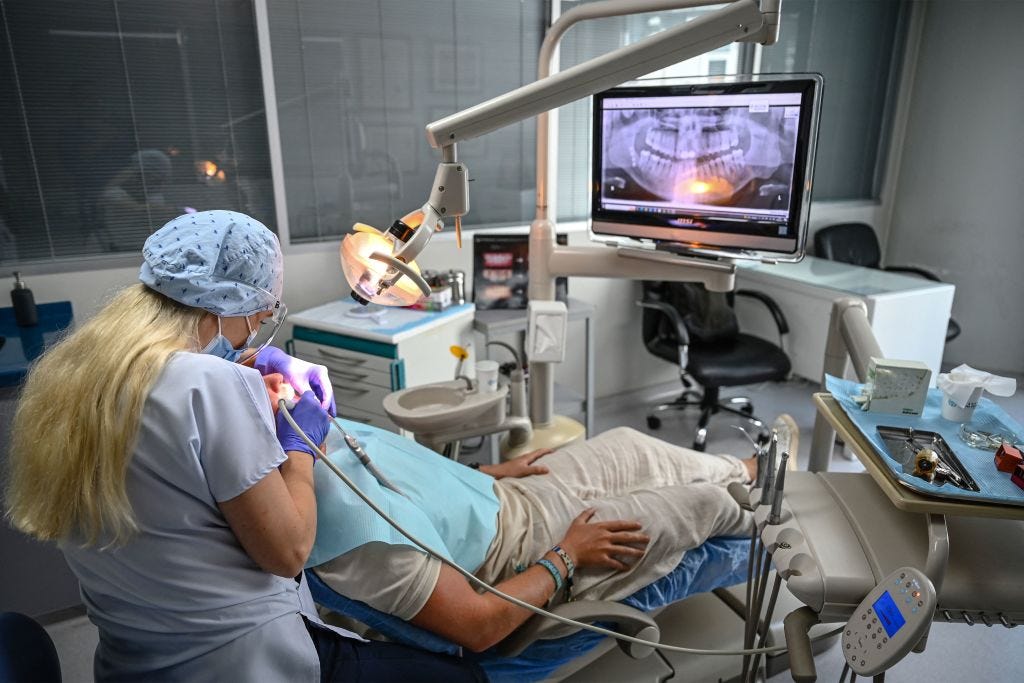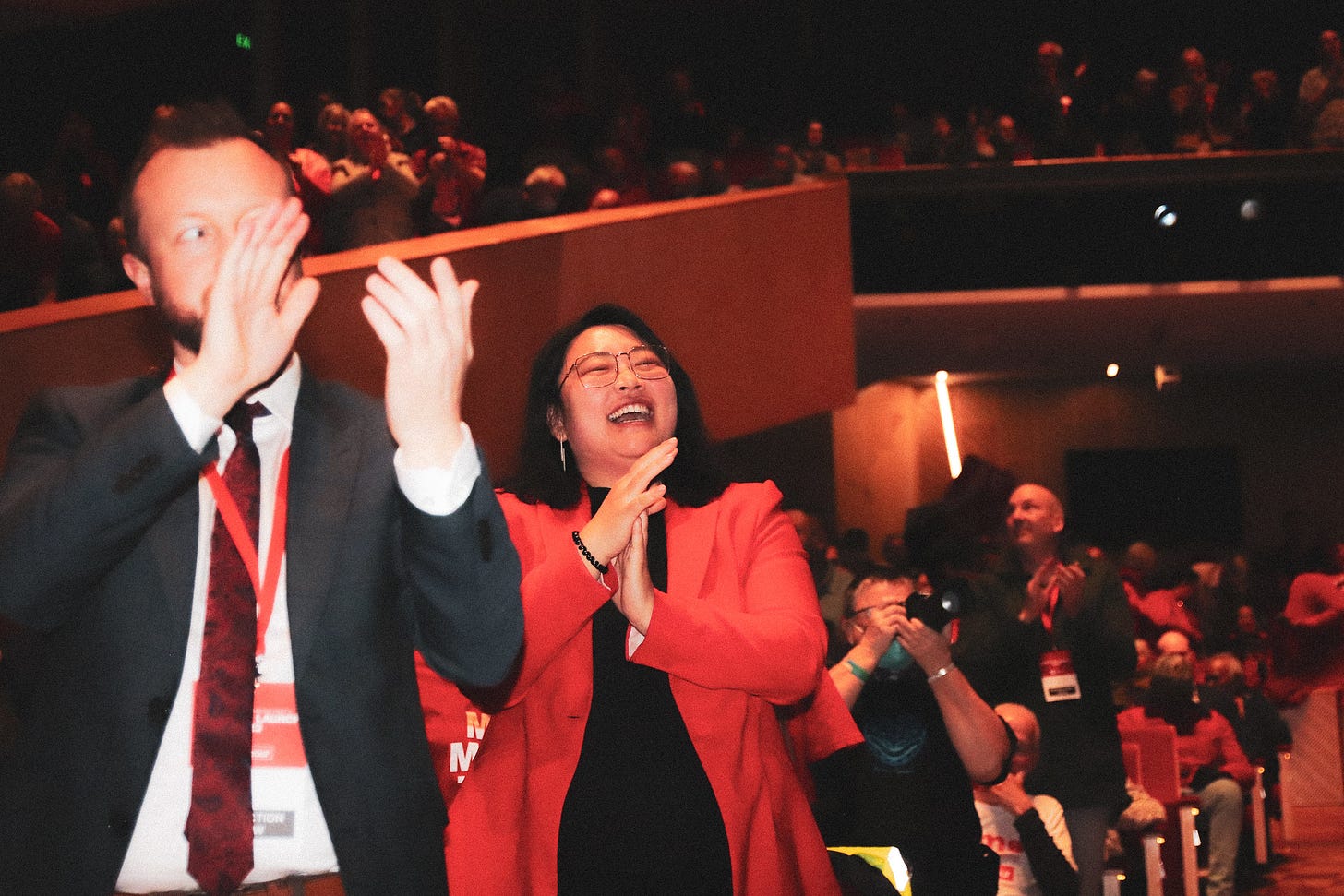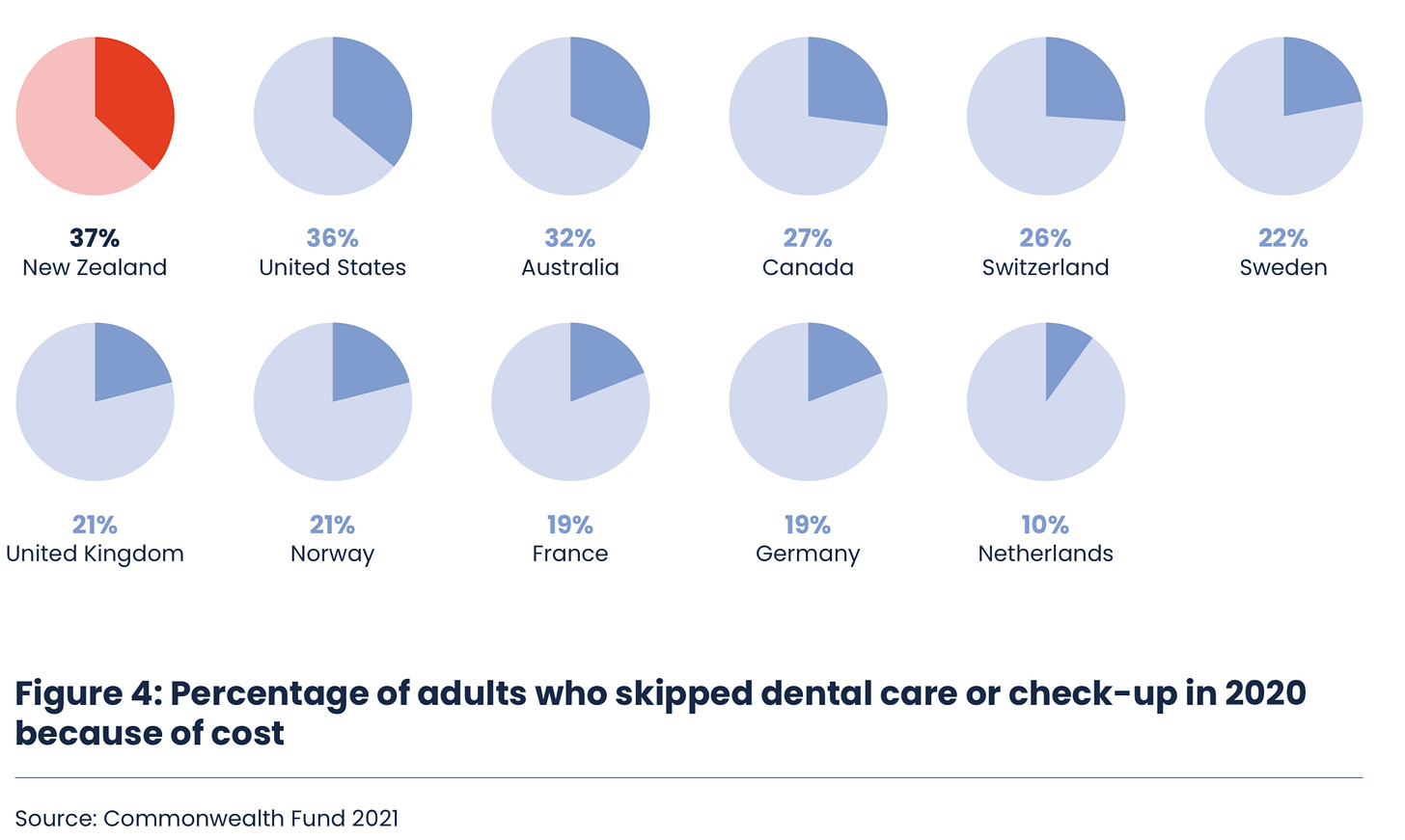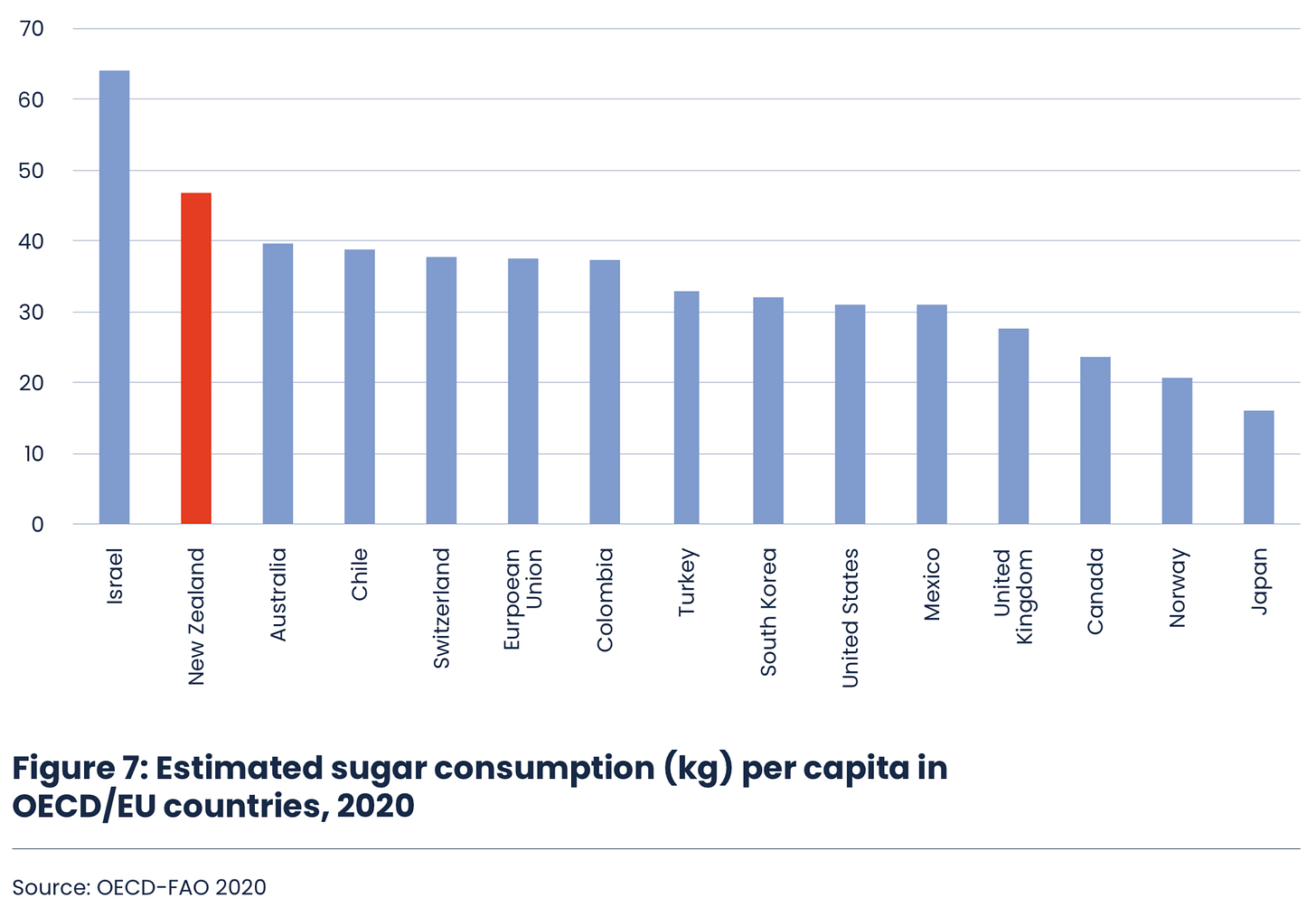
TL;DR: In our first formal edition of The Kākā Project for Election 2023, we examine the parties’ policies on publicly-funded dental care and make the case for universality.
The podcast above includes an interview with Max Harris from ActionStation, one of the campaigners for universal dental care. He details how the campaign formed and how and why the ‘Overton Window’ was widened to include public debate on universality, where it was once not discussed.
This article and podcast is being published immediately and in full for all subscribers to read, listen and share, both the paying ones and the free ones. It does not have a paywall and can be shared. This is part of our commitment to paying subscribers who support our public interest journalism daily. We cover Aotearoa’s political economy with a special focus on housing, climate and poverty. Join our active community of paying subscribers to help us do more.
Through the lens of The Kaka Project
In The Kaka Project for Election 2023 we try to put the latest policy or political development into the context of:
the key problems, facts and history around the issue being addressed by the election policy or political issue;
The alternatives proposed by other political parties standing for election, regardless of whether they’re already in Parliament or polling suggests they are on track to be elected;
the pros and cons, trade-offs, unintended consequences and flow-on implications to other areas of the political economy from those policies;
unanswered questions; and,
the options from overseas or policies not proposed by political parties, including The Kaka Project’s current preferred policy.
The news this week
PM Chris Hipkins launched Labour’s policy to extend publicly-funded basic dental care from under-18s to under 30s from July 26 at the party’s campaign launch on Saturday. He also said Labour wanted to extend this type of state-funded dental care universally at some point, but said the estimated $1 billion per year extra cost (0.25% of GDP per year or $10 per household per week) was not affordable now.
If Labour wins a third term on October 14, it will fund annual check-ups, cleans, X-rays, basic fillings and extractions for nearly 800,000 under 30-year-olds. The funding would be extended from 18 year old up to 23-year-olds from July 2025, expanding to 29-year-olds from July 2026.
Labour said it would increase the dental course cap by 50% to 90 new students a year at a cost of $10 million per year to expand the workforce. The policy would increase the share of the population with this level of subsidised care to 40%, and increase the subsidies by $390 million over four years, with the final year’s full extra cost of $160 million per year by 2027/28.

Hipkins was asked repeatedly at the news conference after his campaign launch address as to why Labour didn’t go universal immediately or sooner. He said it was not affordable now and capacity in the dental workforce needed to be built up. I asked Hipkins if the future financial liability of not going universal had been measured, and if it had, whether it justified going universal earlier. He simply said it could not be afforded.
Health Minister Ayesha Verrall said the Government hoped to get an extra 200 dental workers migrating here under the green list to start ramping up capacity. She said there remained a waiting list in hospitals for dental surgery for kids with rotten teeth, although it had been reduced in recent months.
The policy document referred to Te Whatu Ora’s August 2022 Reset and Restore plan from its Planned Care Taskforce that made various recommendations about addressing poor access to surgery for Maori and Pacifica patients, and long waiting lists for dental procedures. The document said the Labour Government had provided additional funding though the COVID-19 Recovery Relief Fund for 720 additional procedures in the four months from February 2023. Further funding to reduce dental surgical waitlists for 2023/24 was part of $118 million allocated in Budget 2023 to reduce waiting lists.
The document also referred to The Dunedin Study’s 2020 paper on oral health from its longitudinal study, which concluded (bolding ours):
There is no ‘perfect’ oral health care system, and New Zealand’s current system serves the majority of the country’s younger people well, but more needs to be done to address inequity in access to dental care among New Zealand adults. Parental oral health is associated with that of the next generation. The argument that efforts to improve the oral health of adults (particularly young mothers) will have benefits for the oral health of children throughout life stands up to both reason and analysis. Changes in the dental health system will not happen without significant shifts in policy at all levels of government, and actions towards this must be universal and proportionate to need.
The problem of low dental service utilisation among young adults remains an enduring problem. The 2017/18 National Health Survey reported 44% of the NZ population had put off dental care during the past year due to the cost, but among those aged 25–34 the figure was 59%. Dunedin Study findings have shown that, as the responsibility of dental care shifted onto the individuals themselves–especially for those who are socio-economically disadvantaged–poorer oral health outcomes can be expected.
Young adulthood tends to be a period of life when disposable income is low and other priorities (e.g. tertiary study, raising children) mean dental care is beyond reach. It is crucial that we recognise the unmet dental needs of our population and adapt New Zealand’s oral health system to have appropriate focus on prevention and primary dental care. More needs to be done such so that the oral healthcare system can help redress the current inequalities in child oral health into and through adulthood. The Dunedin Study’s 2020 paper on oral health
The facts of the matter
Labour promised the extension of free basic dental care from young children to under-18s in the 2005 election, but has argued it was too expensive to extend beyond 18 since then, although members at a Labour party conference in 2018 voted for universal free dental care.
Over 1.5 million adults have a cost-related unmet need for dental care and over 15,000 hospital stays a year are needed for treatment of oral health conditions.
Treasury research has estimated the real economic cost of ill-health generally at between $10 billion and $27 billion.
A NZ Dental Association study from 2019 found that Treasury’s Cost Benefit Analysis (CBAx) model produced $1.60 in benefits to the Government for every $1 spent when $590 per adult per year was spent on primary health care, with $4.50 of societal benefits for every $1 spent.

Other parties’ policies
The Green Party has proposed free dental care for all through a new community-based New Zealand Dental Service at an annual operating cost of $1.71 billion by 2025/26 and capital expenditure of $150 million over four years on mobile clinics and equipment, to be funded by a wealth tax.
The National Party does not appear to have a specific dental policy, but at the 2020 Election proposed to spend an extra $30 million on improving dental services for children, including a free toothbrush, toothpaste and information pack each year and a free fluoride varnish.
Te Pati Maori has proposed free health and dental care for families earning less than $60,000 per year. The Opportunities Party has proposed free primary dental care for under-30s.
The ACT Party and the NZ First Party do not appear to have specific policies for dental care.
Pros, cons, trade-offs, unintended consequences & implications
Spending less on public dental care costs reduces the amount of the Government’s operational spending deficit and reduces public borrowing, which in turn reduces interest rates and mortgage rates (all other things not changing).
Ramping up spending on public health care would require extra training and employment of thousands of dentists and dental technicians within Te Whatu Ora, or recruitment of trained migrants, and would take many years.
Unanswered questions
What studies have Treasury or the Ministry of Health done using cost benefit analysis of the benefits to the Government and society of extra public spending on universal primary dental care?
What long-term liabilities have been included in The Crown’s financial accounts of not spending money to extend universal dental care to all adults from under-18s?
The Kaka Project proposals
Publicly-funded primary dental care for all, justified by operational spending and capital spending less than the long-term liabilities of not spending the money.
Sugar taxes on beverages and confectionary, along with bans on sugary drinks in schools and sugary food advertising.
This proposal is part of a wider Kākā Project plan for:
a broad-based and low-rate tax system on income, spending, land, climate emissions, water pollution, treated water and congestion to fund publicly funded education, health, transport and housing;
that includes a 0.5% per annum tax on all residential zoned land (with multiples for unoccupied homes and land) to fund infrastructure that enables enough zero emissions housing and transport infrastructure to halve emissions by 2030 and remove them completely by 2050; and,
that achieves housing and transport affordability for all by 2050, as measured by renting or ownership costs being less than a combined 40% of disposable income for those in the poorest quintile of earners.
My view: There’s a good case for a much faster and wider application of such basic free dental care because of the long term costs in hospital care and long term productivity for not treating and preventing oral surgery. A proper accounting of those liabilities would provide the financial justification for that more extensive and faster adoption of subsidised pre-emptive care.
But Labour has instead chosen lower deficits and lower interest rates, serving the interests of home-owning median voters benefiting from tax-free gains in residential land values.
Labour is choosing to continue those incentives for a low investment, low wage economy that stores up big climate, health and productivity liabilities for future voters, along with extensive ongoing inter-generational wealth transfers from young renters to old land owners.
Your view? Suggestions for other editions of The Kākā Project?
Ka kite ano
Bernard

















Share this post